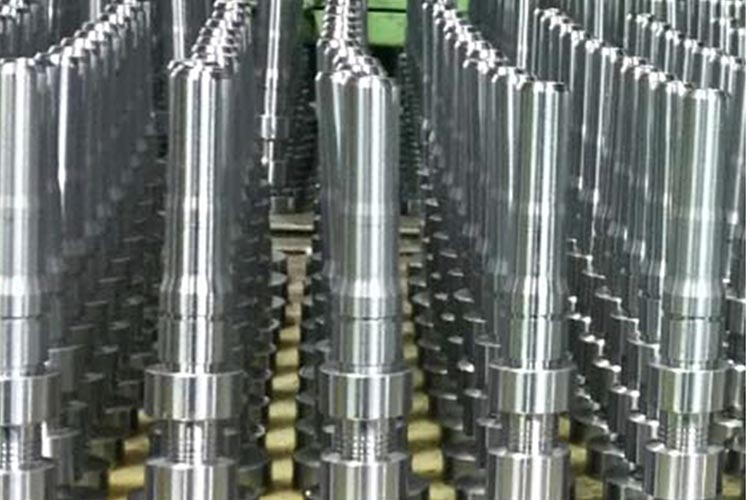Fully automated systems are a true advantage for today’s large manufacturers but with the increased productivity output and reliability comes big challenges from small chips which create stress for machinists, the workpiece, tools and machines.
When auto parts producer Masung in Mungyeong, South Korea went the next level up and updated their factory, they found that chips were becoming the bane of their existence and hampered the parts they were producing for the big Korean car makers.
What they found was a constant stream of alarms followed by machines automatically shutting off because of those nagging metal chips that would either wrap around the tool or become so long that other problems would stem from their rise out of the workpiece.
In order to remedy this constant stoppage to their production line, Masung placed a challenge to their cutting tool suppliers from Japan, Sweden and South Korea.
Up for the challenge and equipped with the right tools for the job, TaeguTec sat down with the production manager of this technologically advanced company that is responsible for important innovations in the automotive manufacturing sector to examine their machining process and figure out a way where they can increase productivity, cut cost and make sure that every step of the manufacturing line flows smoothly without interruptions.
While the rest of the companies could not deliver results, TaeguTec offered simple advice: simply change the inserts, do a few improvements in the work process and upgrade their tools.
Out of the plethora of parts Masung creates for Korean automakers, two were of extreme importance: the input shaft and the seven-speed double clutch transmission.
The input shaft delivers power from the clutch into the transmission. To properly produce this quality part that can safely handle the stress of everyday driving, Masung setup 13 lines producing 100,000 input shafts per month.
Because of the complex machining process that entails setting the right cutting parameters mixed with choosing the proper cutting tool that would effectively break or control the size of chips, TaeguTec started Masung’s manufacturing improvements on one line. Since then, TaeguTec has improved four lines (at the time of this story) with the remainder slated for the near future.
To effectively machine the input shafts at a fraction of the cost while also increase productivity and eliminate slowdowns on the line, TaeguTec engineers applied their highly successful game-changer, the RhinoRush line, to machine input shafts made from SCR420HB and SCM920HVSI materials.
While other cutting tool companies were having problems recommending a small selection of tools to do the job, TaeguTec simplified the insert selection process by using four different kinds of chip formers; a feat that was not duplicated by other companies.
By doing so, TaeguTec’s RhinoRush eliminated those nasty long chips from forming and creating havoc on the assembly line. The results where exactly what Masung was hoping – TaeguTec increased the tool life and substantially reduced the size of metal chips like no other company could.
Out of the three lines TaeguTec had to improve, each line saved on average anywhere from 10 to 27 percent machining cost over the Japanese competition.
The RhinoRush line is a series of mini tuning inserts that meet the manufacturing industry’s needs of reduced machining cost. The 9 and 13 millimeter line of inserts are just as strong as the 12, 15 and 16 mm inserts but at a fraction of the cost and size.
What makes this tool stand out from the rest is not only the series’ small and durable size, but also its unique two directional clamping force that outperforms conventional ISO directional clamping force tools on the market.
Another tool the Asian metalworking giant applied to the process of creating better, safer and more reliable input shafts for Masung and Korean automakers is the T-Burst QuadRush Line.
With its four corners compared to the existing three corners Masung was using from another cutting tool provider, TaeguTec was able to improve tool life by 50 percent per corner. Moreover, the question of out of control chips during the grooving process was rectified.
TaeguTec’s T-Burst high-pressure coolant tool was designed to meet the groove-turning and parting machining needs of difficult-to-cut materials such as titanium, Inconel and other heat resistant alloys.
With the coolant outlet located on the upper jaw, directly over the insert, TaeguTec’s T-Burst high-pressure coolant, which is supplied through the tool holder’s internal coolant channel, shoots out enough force and speed to the insert’s cutting edge thus allowing for lubrication of the material and cutting tool, as well as effective cooling, excellent chip breaking and increased tool life while preventing built-up-edges.
The other process in need of improvement was the seven-speed double clutch used in more and more models which makes sporty driving performance possible due to its direct drive and lightning-fast gear changes.
The materials employed to produce these innovative transmission parts are SCR420HB and are used in many popular Korean passenger vehicles and SUVs.
Masung produces over 4 million DCT parts for Korean automakers so any slowdown in the manufacturing process will have detrimental affects to their bottom line.
Again, in order to remedy the creation of elongated chips, TaeguTec simplified the chip former selection and replaced the CNMG 12 and DNMG 15 inserts used with RhinoRush TNMG 13 six-corner inserts, a process that improved the line and reduced the cost by 30 percent.
Masung has been so pleased with the overall performance by TaeguTec’s tools and service that the Asian metalworking giant has increased its presence from 10 percent to 40 percent at the time of the visit with more being phased-in every month.
In machining, a problem like poor chip manageability can cause massive challenges no matter the size of the manufacturing company. For TaeguTec, reading chip formation is like reading tea leaves – this is where answers are found in order to control turning cost, tool life and surface finish, all factors that increase the overall manufacturing process and heighten process security.


